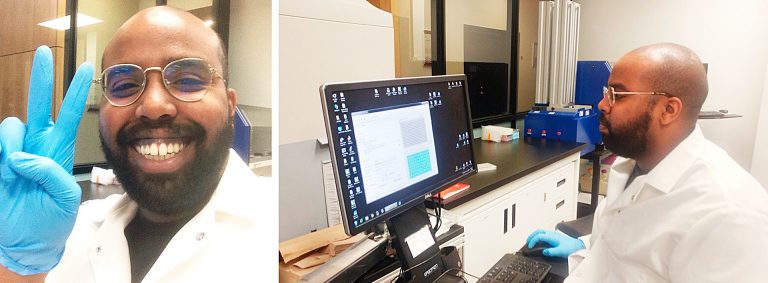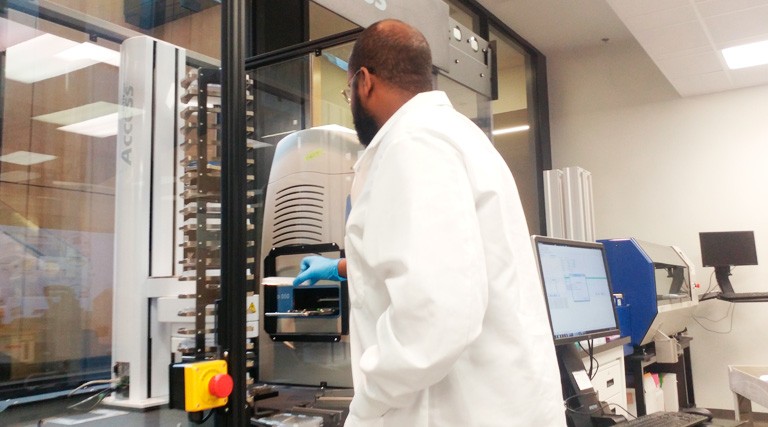Grad student Jama Hagi-Yusuf is investigating how to convert fatty acids into biofuels

A recent United Nations Intergovernmental Panel on Climate Change report warned that we have just 12 years to keep global warming at 1.5°C or risk devastating impacts for hundreds of millions of people. Jama Hagi-Yusuf hopes his research can contribute to this worldwide shift.
The second-year master’s student in Concordia’s Department of Biology investigates how a bacterial enzyme that converts fatty acids into terminal alkenes, called OleT, could be the key to developing biofuels. The implications of his research could significantly impact the effects of climate change on future generations.
Hagi-Yusuf is a member of the Kwan Lab, led by David Kwan, assistant professor of biology in the Faculty of Arts and Science. He and his colleagues at the laboratory focus on the function and engineering of enzymes and proteins, and they carry out research using techniques in synthetic biology.
Concordia is a wonderful place to grow as a scientist

How does this specific image relate to your research at Concordia?
Jama Hagi-Yusuf: This is the Echo 555 Liquid Handler, which uses sound waves to transfer nanolitre volumes of liquid to specific wells on my test plate. I work with microlitre volumes in my experiments and the Echo 555 helps me perform hundreds or thousands of tests more quickly and accurately than I could by hand.
What is the hoped-for result of your project? And what impact could you see it having on people’s lives?
JHY: We developed a biochemical strategy that can detect the production of terminal alkenes from the conversion of fatty acids by OleT. The alkenes are hydrocarbons that are highly valuable in industry for lubricants, surfactants and other fine chemicals.
The focus of my project is to use the OleT enzyme to make biofuels. The tool we created will allow scientists to study the activity of this enzyme more efficiently, as well as study other variants that exist in nature.
By finding the right variant of OleT, we will be able to make biofuels that completely alter our relationship with the planet. Biofuels will help us tackle global warming and its effects on our climate.
What are some of the major challenges you face in your research?
JHY: The biggest challenge is experimenting in aerobic environments with OleT. Carbon dioxide (CO2) is abundant in our atmosphere and is also one of the by-products of the OleT reaction that our tool detects.
By identifying the amount of CO2, we can observe the behaviour of the enzyme and how many alkenes the conversion produces. We’ve also had to be creative to take into account background CO2 so it does not interfere with our analysis.
What are some of the key areas where your work could be applied?
JHY: Currently, you can only test a few samples of OleT at a time. With our strategy, we can examine thousands of variants or engineered mutants of OleT. This increase gives us more opportunities to identify an optimized mutant of OleT that we can use for biofuels or other applications.
What person, experience or moment in time first inspired you to study this subject and get involved in the field?
JHY: I first encountered this field of research as a member of an undergraduate International Genetically Engineered Machine (iGEM) team during my third and fourth years at the University of Waterloo. We used synthetic biology to tackle many problems, from biocomputing to antibiotic resistance.
My time with the iGEM team was my first hands-on experience working in science — it helped me to think like a scientist and to understand my classes a lot more too.
How can interested STEM students get involved in this line of research? What advice would you give them?
JHY: Concordia has an iGEM team and interested students should apply. It’s a wonderful opportunity to learn about project design and teamwork, as well as to build experience in molecular biology. Fourth-year research projects are also a great way for students to gain research skills.
What do you like best about being at Concordia?
JHY: Concordia has been a wonderful place for me to grow as a scientist. There’s a camaraderie that exists between graduate students and researchers — we all want to push the limits of science in ethical ways.
Are there any partners, agencies or other funding/support attached to your research?
JHY: The Fonds de recherche du Québec - Nature et technologies and the Natural Sciences and Engineering Research Council of Canada fund my project.
Learn more about Concordia’s Department of Biology.




